Book contents
- Governing Climate Change
- Cambridge Studies on Environment, Energy and Natural Resources Governance
- Governing Climate Change
- Copyright page
- Contents
- Acknowledgements
- Abbreviations
- 1 Global Cities, Climate Change, and Transnational Lawmaking
- 2 Theoretical Framework
- 3 The Rise of the City in International Affairs
- 4 City Action on Climate Change
- 5 Transnational Urban Climate Governance via Networks: The Case of C40
- 6 Cities as Transnational Lawmakers
- 7 A Normative Assessment of Urban Climate Law
- 8 Conclusion
- Select Bibliography
- Index
8 - Conclusion
Published online by Cambridge University Press: 04 June 2018
- Governing Climate Change
- Cambridge Studies on Environment, Energy and Natural Resources Governance
- Governing Climate Change
- Copyright page
- Contents
- Acknowledgements
- Abbreviations
- 1 Global Cities, Climate Change, and Transnational Lawmaking
- 2 Theoretical Framework
- 3 The Rise of the City in International Affairs
- 4 City Action on Climate Change
- 5 Transnational Urban Climate Governance via Networks: The Case of C40
- 6 Cities as Transnational Lawmakers
- 7 A Normative Assessment of Urban Climate Law
- 8 Conclusion
- Select Bibliography
- Index
Summary
INTRODUCTION
The UNFCCC entered into force in 1994, the first milestone in the international community's search for a collective response to climate change. The attempt to achieve consensus amongst the 197 countries that ratified the UNFCCC on what needed to be done next to achieve the treaty's objectives was always going to be difficult. Social cooperation has been key to the survival and success of our species, and we Homo sapiens have created many myths and fictions that have given us unprecedented ability to cooperate flexibly in large numbers. Wolves and chimpanzees cooperate in groups, but they can do so only with a limited number of other individuals with whom they share intimate social bonds. It has been suggested that Homo sapiens managed to cross the critical threshold and eventually create cities and empires of millions of people because of fiction. ‘Any large-scale human cooperation – whether a modern state, a medieval church, an ancient city or an archaic tribe – is rooted in common myths that exist only in people's collective imagination.’
The state is a myth, and a powerful one. Two Singaporeans who have never met one another might risk their lives to save each other because they believe in the existence of the state of Singapore, its history as a modern nation, and a common national identity. This myth, however, can also stand in the way of collective action. One of the most contentious issues that marred the international climate change negotiations for years can easily be summarized thus: Why should my country reduce GHG emissions when yours is not required to? Why should my country bear the risk of slower economic growth while yours is allowed to burn unlimited amounts of fossil fuels to power factories, ports, and homes? Homo sapiens have single-handedly caused anthropogenic climate change within the equivalent of a fraction of a second in Earth's cosmic history, and our myths have hindered us from effectively working together to remedy the problem.
However, perhaps not all is lost. The lack of progress in the international climate change negotiations has inspired other actors to find solutions. Universities have been working together with venture capitalists and philanthropic organizations to develop clean technologies for the future.
- Type
- Chapter
- Information
- Governing Climate ChangeGlobal Cities and Transnational Lawmaking, pp. 187 - 197Publisher: Cambridge University PressPrint publication year: 2018



